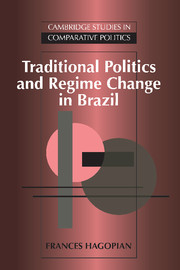Book contents
- Frontmatter
- Contents
- List of tables and figures
- Preface
- Glossary of abbreviations and Portuguese terms
- 1 Introduction: Traditional politics, new authoritarianism
- 2 Oligarchical power and traditional politics in Minas Gerais
- 3 The modern political economy of traditional politics
- 4 Bureaucratic authoritarianism and the state elite
- 5 Back to patronage: State clientelism in Minas Gerais
- 6 Authoritarian politics and traditional elites
- 7 The traditional political elite and the transition to democracy
- 8 Continuity in change: Brazilian authoritarianism and democratization in comparative perspective
- Appendix: The Minas elite
- References
- Index
5 - Back to patronage: State clientelism in Minas Gerais
Published online by Cambridge University Press: 06 January 2010
- Frontmatter
- Contents
- List of tables and figures
- Preface
- Glossary of abbreviations and Portuguese terms
- 1 Introduction: Traditional politics, new authoritarianism
- 2 Oligarchical power and traditional politics in Minas Gerais
- 3 The modern political economy of traditional politics
- 4 Bureaucratic authoritarianism and the state elite
- 5 Back to patronage: State clientelism in Minas Gerais
- 6 Authoritarian politics and traditional elites
- 7 The traditional political elite and the transition to democracy
- 8 Continuity in change: Brazilian authoritarianism and democratization in comparative perspective
- Appendix: The Minas elite
- References
- Index
Summary
A cornerstone of the military's economic project was to gain control of the levers of the economy through fiscal centralization. Traditionally in Brazilian politics, fiscal federalism had enabled the administration of public programs to become entangled with party politics in a clientelistic political order that blurred the divisions between public resources and private power. By transferring control of fiscal resources from the states to the federal government, the military hoped both to ensure financial stability and to remove the blight of political clientelism from state administration. In that the fiscal dependence of impoverished municipalities had left local elites, and their subjects, in a position of political subservience to whoever controlled the public purse, the military project also entailed shifting the focal point of municipal dependence from the states to the union and, ultimately, weakening the regional oligarchies.
Clientelism soon proved to be less retractable than the military had anticipated, however, and eliminating it was no more politically feasible than dispensing with traditional political elites. The measures introduced by the authoritarian regime to centralize finance – primarily centralizing tax collection and pegging transfers to federal guidelines – did not complete the anticipated fiscal centralization, and as such were grossly inadequate measures to defeat clientelism. They did not transfer control over patronage from regional traditional political elites to the federal government and technocratic policy makers. Even during the period of strained relations between traditional political elites and military reformers, the Minas state oligarchy was capable, through state, transferred, and borrowed resources, of sustaining its patronage operations.
- Type
- Chapter
- Information
- Traditional Politics and Regime Change in Brazil , pp. 140 - 177Publisher: Cambridge University PressPrint publication year: 1996
- 2
- Cited by

